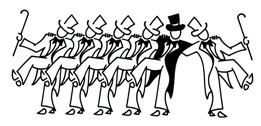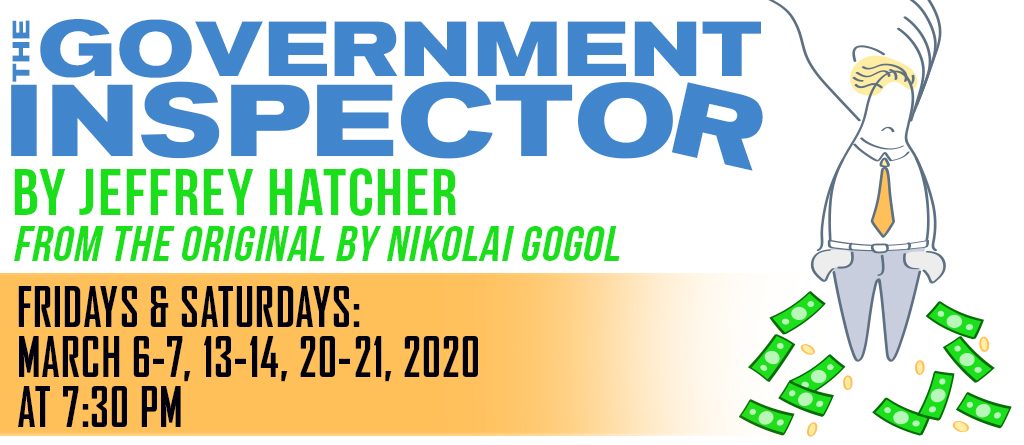*Due to the coronavirus pandemic, the cdc has requested we cancel our shows for the time being *
What happens when an unlucky nobody is mistaken for a powerful Russian government official by a group of corrupt small town officials? Find out when INDEPENDENT PLAYERS presents Nikolai Gogol’s The Government Inspector Fridays and Saturdays, March 6-7, 13-14, 20-21, 2020 at the Elgin Art Showcase, 164 Division Street, Elgin. Curtain time is 7:30 PM.
Originally published in 1836, The Government Inspector was based upon an anecdote allegedly recounted to Gogol by Alexander Pushkin. Gogol attempted to write a satirical play about imperial bureaucracy in 1832, but abandoned it for fear of censorship. He then wrote to Pushkin seeking inspiration for a new satirical play in the form of “an authentically Russian anecdote.” Pushkin had a storied background and was once mistaken for a government inspector, so he wrote back: “Krispin arrives in the Province … he is taken for an official … The governor is an honest fool–the governor’s wife flirts with Krispin who then woos the daughter.”
Thus we have the basic story elements for The Government Inspector, Gogol’s comic Masterpiece. Essentially, it is a comedy of errors, satirizing human greed, stupidity, narcissism and the extensive political corruption of Imperial Russia. So, why then is The Government Inspector—surely one of the most Russian examples of Russian culture—such a universal play?
According to Jeffrey Hatcher, the adaptor of the version of the play IP is using, explains it this way: “If you ask a Frenchman ‘What do you wish for your country,’ the Frenchman will say ‘I wish for my country the poetry of Rimbaud, the beauty of Paris, the majesty of Napoleon.’ If you ask a German, ‘What do you wish for your country,’ the German will say, I wish for my country the greatness of Goethe, the grandeur of Wagner, the philosophical insights of Nietzsche.’ If you ask a Russian, “what do you wish for your country,’ the Russian will say, “I wish that my neighbor’s cow should die!’”
Hatcher continues: “There is more to Russia than that, of course—Tolstoy, Chekhov, the dog that went up in Sputnik—but it’s been argued that the reason why Russia and its people have always felt a bit backwards in comparison with their more cosmopolitan counterparts in Paris, London and Vienna is because the Renaissance and the Enlightenment skipped them completely. Nobody came to give them the word. This tends to be blamed on the country’s vast expanses and terrible weather—destiny as defined by geography and mud.”
“This may explain why Russia, be it Tsarist, Soviet, or Putinesque has such a wobbly respect for good government, civic standards and the law, and why the west has always looked down its nose at Russia, regardless the charms of Dostoevsky, The Nutcracker and Mrs. Khruschev’s sense of style. In one sense, it’s the classic case of a very original and specific idea–a hapless nobody is mistaken for a powerful government official by a group of corrupt, small town officials. But it is also because its characters are so recognizable to any person in any country in any age who has attended a city council meeting, met a contractor, or had an inflated opinion of himself.”
Nikolai Vasilievich Gogol (31 March 1809-4 March 1852) was a Russian playwright, short story writer and novelist of Ukrainian origin who was considered by his contemporaries to be one of the preeminent figures of the natural school of Russian literary realism. Later critics have found in his work a fundamentally romantic sensibility, with strains of surrealism and the grotesque (in such short stories as “The Nose” and “The Overcoat”). Like The Government Inspector, his novel Dead Souls satirized political corruption in the Russian Empire. He is also known for his novel Taras Bulba, the play Marriage and his short story “Diary of a Madman.” He is probably best known for The Government Inspector, the plot of which goes as follows:
The corrupt officials of a small Russian town, headed by the Mayor, react with terror to the news that an incognito inspector will soon be arriving in their town to investigate them. The flurry of activity to cover up their considerable misdeeds is interrupted by the report that a suspicious person has arrived two weeks previously from Saint Petersburg and is staying at the inn. That person, however, is not an inspector; it is Hlestakov, a foppish civil servant with a wild imagination.
Having learned that Hlestakov has been charging his considerable hotel bill to the Crown, the Mayor and his crooked cronies are immediately certain that this upper-class twit is the dreaded inspector. For quite some time, however, Hlestakov does not even realize that he has been mistaken for someone else. Meanwhile, he enjoys the officials’ terrified deference and moves in as a guest in the Mayor’s house. He also demands and receives massive “loans” from the Mayor and all of his associates. He also flirts outrageously with the Mayor’s wife and daughter.
Sick and tired of the Mayor’s ludicrous demands for bribes, the village’s merchants arrive, showering Hlestakov with gifts and promises and beg him to have the Mayor dismissed from his post. Stunned at the Mayor’s rapacious corruption, Hlestakov states that he deserves to be exiled in chains to Siberia. He is able to swindle the town residents, merchants and polititians who want him to keep their own corruption quiet.
Terrified that he is now undone, the Mayor pleads with Hlestakov not to have him arrested, only to learn that the latter has become engaged to his daughter. At this point, Hlestakov announces that he is returning to St. Petersburg, having been persuaded by his valet Osip that it is too dangerous to continue the charade any longer.
After Hlestakov and Osip depart on a coach driven by the village’s fastest horses, the Mayor’s cohorts arrive to congratulate him. Certain that he now has the upper hand, he turns on them lording his good fortune over them. Suddenly, the Postmaster arrives carrying an intercepted letter which reveals Hlestakov’s true identity and his mocking opinion of them all.
After years of lording his position over everyone in the town, the Mayor is enraged to have been so thoroughly humiliated. He screams at his cronies and blames them for what has befallen the town. This ranting comes to an abrupt halt when an Imperial Messenger arrives on the scene and announces that the Government Inspector demands to see the Mayor immediately at the inn. As one critic so ably put it, The Government Inspector is “witty, smart and wildly satirical; Gogol’s play offers a hilarious reminder of the terrifying timelessness of bureaucracy and buffoonery!”
Gogol’s impact on Russian literature has endured, yet various critics have appreciated his works in varying ways. D.S. Mirsky characterized Gogol’s universe as “one of the most marvelous, unexpected—in the strictest sense, original worlds ever created by an artist of words.” Another main characteristic of Gogol’s writing is “his ‘impressionist’ vision of reality and people. … His characters are caricatures, drawn with the method of a caricaturist—which is to exaggerate salient features and reduce them to geometrical pattern. But these cartoons have a convincingness, a truthfulness, and inevitability—attained as a rule by slight but definitive strokes of unexpected reality—that seems to make the visible world itself appear. The aspect under which the mature Gogol sees reality is expressed by the Russian word poshlost’, which means something similar to “triviality, banality, inferiority”, moral and spiritual, widespread in some group or society. Gogol was a great destroyer of prohibitions and of romantic illusions. He undermined Russian Romanticism by making vulgarity reign where only the sublime and the beautiful had before. Characteristic of Gogol is a sense of boundless superfluity that is soon revealed as utter emptiness and a rich comedy that suddenly turns into metaphysical horror.” (as one can clearly see in The Government Inspector.)
As was noted at the offset, this production plays Fridays and Saturdays, March 6-7, 13-14, 20-21, 2020 at The Elgin Art Showcase, 164 Division Street, Elgin. Curtain time is 7:30 PM. The production is directed by IP’s Artistic Director, Don Haefliger, and features a cast which includes Steve Connell, Gabor Mark, Dana Udelhoven, Jim Pierce, Katrina Syrris, Steve Delaney, Nicole Netsen, Trace Gamache, Lynn Sciaraffa, Brian McLeod, Beth McDonald, Marilyn House and Devon Ortiz.
Tickets are $20; Senior Citizens and Students (14-21) are $15. Click here to Purchase Tickets (credit card) and at the door prior to each performance (cash/check only). For Information /Reservations: (847) 697-7374.


